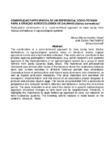Use este identificador para citar ou linkar para este item:
http://biblioteca.incaper.es.gov.br/digital/handle/item/533Registro completo de metadados
| Campo DC | Valor | Idioma |
|---|---|---|
| dc.contributor.author | SALES, M. N. G. | pt_BR |
| dc.contributor.author | PADILHA, J. C. F. | pt_BR |
| dc.contributor.author | SCHMIDT, W. | pt_BR |
| dc.contributor.other | Márcia Neves Guelber Sales, Incaper; José Carlos Fiad Padilha; Wilson Schmidt. | pt_BR |
| dc.date.accessioned | 2015-01-13T16:48:27Z | - |
| dc.date.available | 2015-01-13T16:48:27Z | - |
| dc.date.created | 2004 | pt_BR |
| dc.date.issued | 2015-01-13 | pt_BR |
| dc.identifier.other | 4996 | pt_BR |
| dc.identifier.uri | http://biblioteca.incaper.es.gov.br/digital/handle/item/533 | - |
| dc.description | The construction of a socio-technical approach to raise laying hens (Gallus domesticus) in agroecological systems relies on literature review, organic agriculture norms and empirical data collection. This study aims to contribute to this process applying participatory methodologies (e.g. action-research) and systemic approach to the implementation of an agroecological system by a group of small farmers from Santa Catarina State, Brazil. The theoretical and philosophical framework was defined after review of the literature where the relationship between hens and human societies in different historical periods was considered. Conceptual basis of permaculture and natural agriculture were also considered, as well as organic production standards. This study describes and examines the conception, implementation and first results of an associative project designed to produce and process organic eggs. The results are presented from a sociocultural perspective and analyses farmer's attitudes and behaviour during the conversion period. The study illustrates to what extent the choice for a specific methodological approach influences changes at farm level and its neighborhood. Therefore, it highlights the importance to apply bottom-up approach to carry out research on hens husbandry systems. The breeding activity analysis is made based on the system's structure. Hens multifunctionality and the benefits of plant-animal interaction are the main results observed. Additionally, a field trial evaluating the behaviour of laying hens bred on pasture showed a good performance of commercial breeds. This study suggests that the conversion period should be evaluated using participatory methodologies; that is essential to invest on the training of farmers and their participation on networks; that cooperation and interchange between farmers and consumers is important; and that the impacts of activity on natural resources an welfare of the birds must be monitored. | pt_BR |
| dc.language | pt_BR | pt_BR |
| dc.publisher | Eisforia, Florianópolis, v. 2, n. 2, p. 126-152, dez. 2004. | pt_BR |
| dc.title | Construção participativa de um referencial sócio-técnico para criação agroecológica de galinha (Gallus domesticus). | pt_BR |
| dc.title.alternative | Participatory construccion of a socio-technical approach to raise laying hens (Gallus domesticus) in agroecological systems. | pt_BR |
| dc.type | -- | pt_BR |
| dc.ainfo.id | 4899 | pt_BR |
| dc.ainfo.lastupdate | 2015-01-13 | pt_BR |
| dc.ainfo.depositante | Merielem Frasson | pt_BR |
| dc.subject.nalthesaurus | Particpatory research | pt_BR |
| dc.subject.nalthesaurus | Organic poultry | pt_BR |
| dc.subject.nalthesaurus | Family farmers | pt_BR |
| dc.subject.nalthesaurus | Agroecology | pt_BR |
| Aparece nas coleções: | Memória Técnica do Incaper  | |
Arquivos associados a este item:
| Arquivo | Descrição | Tamanho | Formato | |
|---|---|---|---|---|
| artigosss.pdf | 253,6 kB | Adobe PDF |  Visualizar/Abrir |
Os itens no repositório estão protegidos por copyright, com todos os direitos reservados, salvo quando é indicado o contrário.
